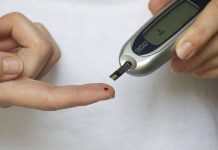“In terms of menopause and sex, your libido dropping because of lower estrogen levels might have a lot to do with your struggling to get in the mood.”
For older women, getting in the mood for sex can feel more like a hurdle to overcome rather than a fun process to explore with foreplay and anticipation. Your estrogen levels aren’t what they used to be, and you might even find that sex has become much more painful than it used to be as a consequence.
Doctors used to think that menopause simply meant no longer having periods, but actually this period is more complicated than that and can pose issues for your emotional, physical, and sexual health. In terms of menopause and sex, your libido dropping because of lower estrogen levels might have a lot to do with your struggling to get in the mood.
Reasons Libido Decreases
Menopause and sex is actually associated with a number of symptoms beyond decreased libido, including: anxiety, bladder control issues, depression, trouble falling and staying asleep, weight gain, and thinning hair. None of these symptoms sounds admittedly sounds that desirable, but neither is any of these symptoms inevitable.
“The truth about all of these sexual issues in menopausal women is that they’re due to changes in hormone levels and changes in blood flow to the vagina.”

Some, but not all, women report a decrease in libido as a result of entering menopause. Depending on the survey, between 65 percent and 85 percent of women report sexual problems as a result of menopause. These rates are significantly lower for younger women still ovulating.
The truth about all of these sexual issues in menopausal women is that they’re due to changes in hormone levels and changes in blood flow to the vagina. Reduced blood flow to your vagina can cause the tissue of your vagina to become thinner as well as the labia to become thinner.
Lower blood flow to these erogenous regions, in other words, can make your vagina significantly less sensitive to touch and the sexual stimulation that you depend on to get yourself in the mood. When you couple a drop off in a critical hormone like estrogen with decreased blood flow to such an important erogenous region, you’re almost surely going to have a harder time getting yourself in the mood for sex.
How to Get Yourself in the Mood
How to get yourself in the mood? Getting yourself in the mood and sharing a sexual experience with a partner can certainly feel more challenging than it used to once you stop ovulating. Changes to to the vaginal tissue as a result of less estrogen can make sex feel more painful than it used to thanks to a thinning of your vagina and dryness.
“Masturbation is a great time to explore your body in a stress-free environment.”
While dryness can be remedied with vaginal dilators and personal lubricants, a more long-term approach to the root cause of a lack of sexual desire once ovulation ceases would be taking an estrogen prescription under your gynecologist’s supervision.

Speaking of adding a little spice into your bedroom routine, you might consider being open with your partner about wanting a few extended rounds of foreplay and incorporating sex toys like vibrators into your foreplay routine. Sometimes nothing works better in terms of breaking out of a rut than changing things up a bit. Exploring your new body and taking your time masturbating can teach both you and your partner what’s working best.
This is not the time to judge yourself. Find out what new regions you like exploring and what kind of pressure your partner should apply when the time comes for a little more excitement. Masturbation is a great time to explore your body in a stress-free environment. If this proves painful, then consider using lubricant and slowly work your way up to more stimulation.
Remedies for Low Libido

Hormone replacement therapy or prescription estrogen in cream form could definitely give you more spice in the bedroom when the moment comes. Studies have shown that hormone replacement therapy really does work to stimulate a woman’s sexual desire. A combination of lifestyle changes, hormone replacement therapy, and playful experimentation can help regain your sex life!
Sources & References:





















